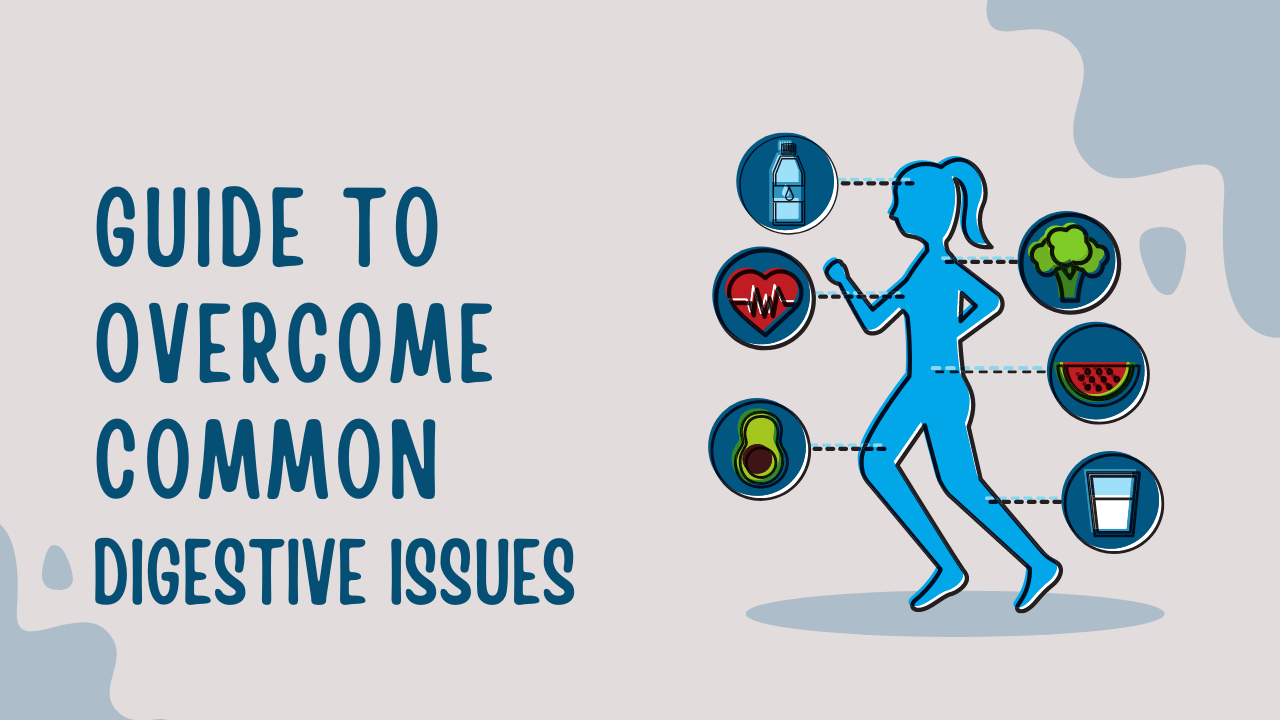Introduction:
Are you tired of dealing with stomach troubles that leave you feeling uneasy and frustrated? You are not alone. Digestive issues affect millions of people every day. The good news is that you may overcome these challenges and start experiencing better digestive health with some simple dietary changes.
In this blog article, we’ll look at the relationship between nutrition and digestive health, cover some of the most prevalent digestive difficulties, and offer advice on what foods to consume and avoid for better digestion. So, if you’re ready to say goodbye to bloating, gas and indigestion, stay reading for our guide to overcoming digestive diseases.
This article can help you if you have an overactive digestive system or a specific illness like irritable bowel syndrome (IBS) or acid reflux. We’ll investigate the underlying causes of these disorders and offer practical suggestions on how to lessen their symptoms through dietary changes.
So grab a cup of soothing peppermint tea (known for its digestive-friendly properties) and prepare to embark on a journey towards improved gut health. By making small but significant changes in your eating habits, you can transform your relationship with food and enjoy a healthier life free of pesky digestive woes.
Stay tuned as we investigate effective techniques for alleviating unpleasant symptoms and increasing general well-being through adequate eating. It’s time to take charge of your gut health; let’s get started!
What is Digestive Health?
When it comes to our overall health, gut wellness is crucial. But what does it all mean? Simply simply, digestive health refers to the proper and efficient operation of our digestive system. It is the process of breaking down food into nutrients that the body can absorb while also eliminating waste items.
A healthy digestive tract enables us to digest and absorb necessary nutrients from the meals we consume. This guarantees that our bodies get the fuel they require for energy generation, growth, and repair. Poor digestive health, on the other hand, can cause a variety of unpleasant symptoms such as bloating, gas, indigestion, constipation, or diarrhoea.
Maintaining excellent gut health necessitates a delicate balance of elements such as nutrition, lifestyle habits, and even stress management. You can dramatically enhance your digestion by adopting a wholesome approach to food and lifestyle practises such as regular physical activity and proper hydration levels.
It’s crucial to remember that everyone’s digestive system is different; what works for one person may not work for another. As a result, it’s critical to pay attention to your body and how various foods make you feel.
The Link between Diet and Digestive Health
What you put into your body is very important when it comes to digestive health. Your food can either encourage gut health or exacerbate typical digestive ailments. Your food choices have a direct impact on how well your digestive system works.
Consuming a balanced diet high in fiber-rich foods such as fruits, vegetables, whole grains, and legumes is one of the most important aspects in maintaining excellent digestive health. These foods give necessary nutrients and aid in the regulation of bowel movements, reducing constipation.
Consuming an excessive amount of processed meals high in sugar and harmful fats, on the other hand, might alter the normal balance of bacteria in your stomach. This imbalance can cause unpleasant symptoms as bloating, gas, and diarrhoea.
Furthermore, certain people may be more sensitive to certain types of food. Those who are lactose intolerant, for example, should avoid dairy products containing lactose to avoid digestive pain.
Furthermore, how you eat is important for proper digestion.
Chewing your meal properly before swallowing promotes digestion by breaking down larger particles into smaller ones that your stomach can assimilate.
Furthermore, eating at a slower speed allows for adequate digestion, lowering the probability of indigestion or heartburn.
Finally, eating is important in keeping excellent digestive health.
We may support our gastrointestinal system and have fewer disturbances or discomforts by choosing nutritious foods rather than relying on processed ones and being attentive about how we eat.
Common Digestive Issues
Digestive problems are quite frequent and can range from slight discomfort to life-threatening illnesses. Many people have digestive issues at some point in their life, and it’s critical to understand the causes and potential cures.
Acid reflux, which happens when stomach acid rushes back up into the oesophagus, is one of the most prevalent digestive illnesses. This might result in heartburn, a burning sensation in the chest. Bloating, burping, and a sour taste in the mouth are also possible symptoms.
Irritable bowel syndrome (IBS) is another common problem, characterised by abdominal pain or cramping, changes in bowel habits such as diarrhoea or constipation, and bloating. While the precise aetiology of IBS is unknown, some triggers, such as stress or particular foods, can exacerbate symptoms.
Many people suffer from digestive issues as a result of food intolerances. Lactose intolerance is a condition in which people have trouble digesting lactose, which is found in dairy products. After consuming these meals, you may have symptoms such as gas, bloating, diarrhoea, or loose stools.
IBD refers to illnesses such as Crohn’s disease and ulcerative colitis that cause chronic inflammation of the digestive tract, resulting in symptoms such as stomach pain, diarrhoea with blood or mucus, weight loss, and exhaustion.
These are just a few instances of frequent digestive problems that millions of individuals deal with on a daily basis. If you have chronic or severe symptoms, you must visit with a healthcare professional to receive an accurate diagnosis and treatment plan suited to your unique needs.
Foods to Eat for Digestive Health
It is critical to pay attention to the meals we eat in order to create a healthy digestive tract. Certain meals can assist to ease and support our digestion, while others might aggravate typical digestive problems. Here are some crucial foods to consider including in your diet for optimal digestive health.
First and foremost, fiber-rich foods are essential for supporting proper digestion. Dietary fibre is abundant in foods such as whole grains, fruits, vegetables, and legumes. Fibre bulks up our stools and aids in bowel movement regulation, reducing both constipation and diarrhoea.
Probiotic-rich meals are another excellent way to boost gut health. Probiotics are living bacteria that have been demonstrated in studies to promote gut health by encouraging the growth of beneficial bacteria in our intestines. Yoghurt, kefir, sauerkraut, kimchi, and other fermented foods are examples of probiotic-rich foods.
Furthermore, regular water consumption is required for healthy digestion. Water softens faeces and helps them pass through the digestive tract.
Furthermore, due to its relaxing effects on the gastrointestinal muscles, peppermint tea has long been used as a natural cure for numerous digestive ailments such as bloating or indigestion.
Finally, ginger has been shown to be useful in lowering nausea, vomiting, and stomach discomfort. It can be eaten raw or as ginger tea.
Remember that everyone’s tolerance for different types of food differs, so listen to your body when incorporating new foods into your diet. Experiment with these ideas to see what works best for you!
Foods to Avoid for Digestive Health
What you eat is quite important when it comes to having a healthy digestive system. Certain meals can disrupt your digestive health and cause unpleasant symptoms such as bloating, gas, and indigestion. Here are a few examples of common causes to avoid:
1. Fatty Foods: Fried foods and high-fat meals are difficult for your digestive system to process. They can cause sensations of heaviness and discomfort by slowing digestion.
2. Spicy Foods: While spicy foods can add flavour to your meals, they can also irritate the lining of your stomach and oesophagus, producing heartburn or acid reflux.
3. Processed foods: These frequently contain additives, preservatives, and artificial components that the body finds difficult to process. Choosing whole foods instead will deliver more nutrients while being gentler on your digestive system.
4. Carbonated beverages: The bubbles in carbonated beverages cause gas to be released in your stomach, resulting in bloating and belching.
5. Dairy Products (for individuals with lactose intolerance): Consuming dairy products might cause diarrhoea, bloating, cramps, and other unpleasant symptoms if you are lactose intolerant.
Making minor changes to your diet, such as limiting or eliminating these troublesome items, could potentially improve many unpleasant stomach problems.
Conclusion
We discussed the importance of a healthy diet in maintaining normal digestion in this guide on overcoming digestive diseases and increasing digestive health. We’ve talked about typical digestive ailments and their causes, as well as nutrients to include in your diet to improve gut health.
Remember that everyone’s body is different, so finding the appropriate strategy for you may need some trial and error. If you have persistent or severe stomach symptoms, it is always a good idea to see a doctor for a proper diagnosis and personalised treatment plan.
You may naturally assist your digestive system by making tiny modifications to your eating habits and integrating more fiber-rich foods, probiotics, and hydrating beverages into your daily routine. Avoiding trigger foods such as processed snacks, fried foods, sugary treats, and excessive caffeine can also help reduce unpleasant symptoms.
Taking care of our digestive health is critical for our overall health. We can overcome common digestive issues and have a healthier gut by making conscious decisions and lifestyle changes aimed at nourishing our bodies from inside.
So start using these tips right away! Your digestive system will appreciate you!
FAQs
- What is gut health and how important is it? Digestive health refers to the healthy functioning of the digestive tract, which includes food digestion and nutrient absorption. It is significant because it has an impact on overall health, nutrient absorption, and the avoidance of digestive problems.
- What effect does diet have on digestive health? Diet has a big impact on intestinal health. A fiber-rich diet and a balanced diet support good digestion and regular bowel movements. Processed foods, high-fat foods, and spicy foods can all induce digestive pain.
- What are some of the most prevalent digestive problems and their symptoms? Acid reflux (heartburn, sour taste), irritable bowel syndrome (abdominal pain, changes in bowel habits), food intolerances (gas, bloating, diarrhoea), and inflammatory bowel disorders (gastric pain, bloody diarrhoea, weight loss) are all common digestive issues.
- What foods should I consume to improve my digestive health? Fiber-rich meals such as whole grains, fruits, vegetables, and legumes aid digestion. Probiotic-rich meals like yoghurt and fermented foods are good for your gut. Drinking plenty of water and relaxing liquids like peppermint tea might also help with digestion.
- What foods should I avoid to improve my digestive health? Fatty foods, spicy foods, processed foods with chemicals, carbonated beverages, and dairy products (for lactose-intolerant persons) should be limited or avoided. These foods can induce stomach pain, bloating, and other digestive problems.




